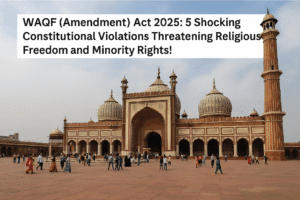WAQF (Amendment) Act 2025: 5 Shocking Constitutional Violations Threatening Religious Freedom and Minority Rights!
The WAQF (Amendment) Act, 2025, has sparked a heated legal debate over its potential constitutional violations, particularly concerning religious autonomy, minority rights, and secularism. Critics argue that it undermines Articles 25 and 26 by allowing non-Muslim appointees to control WAQF boards, compromising religious practice. The Act also discriminates against Muslim institutions by imposing stricter regulations than those applied to other religious endowments, violating Article 14. It threatens property rights under Article 300A by enabling the state to seize WAQF properties without judicial oversight. Additionally, it endangers minority cultural and educational rights protected by Articles 29–30. By encroaching on religious governance, the Act weakens secularism, a core constitutional principle. The retrospective application risks creating legal instability, undermining the rule of law. In light of these constitutional concerns, a reassessment of the Act is necessary to uphold India’s commitment to pluralism and minority rights.

WAQF (Amendment) Act 2025: 5 Shocking Constitutional Violations Threatening Religious Freedom and Minority Rights!
The WAQF (Amendment) Act, 2025, recently enacted to reform the management of Islamic charitable endowments (WAQF properties), has ignited intense legal debate. While proponents argue it aims to streamline administration, critics contend it undermines constitutional safeguards for religious autonomy and minority rights. This analysis delves into the Act’s potential constitutional violations, dissecting its implications for India’s secular fabric and democratic ethos.
Introduction
- Erosion of Religious Autonomy: Articles 25 and 26 in Peril
Religious Practice Under Threat
In Islam, WAQF is a sacred act of dedicating property for charitable or religious purposes, governed by centuries-old principles. The Amendment empowers non-Muslim appointees to oversee WAQF boards and grants district authorities unilateral control over land use. Such state intrusion into a faith-based institution risks violating Article 25, which guarantees freedom of religion, and Article 26, which protects religious denominations’ right to manage their affairs.
Example: By allowing secular authorities to alter the religious character of WAQF boards—traditionally managed by Muslim trustees—the Act dilutes the community’s ability to preserve its religious practices.
- Equality Before Law: A Hollow Promise (Article 14)
Selective Targeting of Muslim Institutions
Hindu, Christian, and Sikh religious endowments operate under distinct laws with minimal state interference. In contrast, the Amendment imposes stringent bureaucratic oversight exclusively on WAQF properties. This differential treatment lacks a rational basis, violating Article 14’s mandate for equality and non-arbitrariness.
Unchecked Executive Power: District Collectors can now de-notify WAQF lands without judicial oversight, creating a risk of biased or politically motivated decisions.
- Property Rights at Risk: Violation of Article 300A
Deprivation Without Due Process
The Act permits authorities to cancel WAQF status or transfer ownership of endowed properties without compensation or court adjudication. This bypasses constitutional safeguards under Article 300A, which prohibits deprivation of property without legal authority.
Case in Point: A mosque or school built on WAQF land could be seized administratively, bypassing judicial scrutiny and leaving beneficiaries without recourse.
- Undermining Minority Rights (Articles 29–30)
Cultural and Educational Institutions in Jeopardy
WAQF properties often fund minority-run schools, hospitals, and cultural centers. By centralizing control, the Amendment risks diverting resources from these institutions, stifling their autonomy—a direct challenge to Articles 29–30, which protect minorities’ right to conserve their culture and administer educational institutions.
- Assault on Secularism: The Basic Structure Doctrine
State Overreach into Religious Domains
The Supreme Court has repeatedly affirmed secularism as part of the Constitution’s unalterable “basic structure.” By entangling the government in WAQF governance—a purely religious institution—the Act blurs the line between state and religion, threatening this foundational principle.
Judicial Review Diluted: Shifting disputes from courts to bureaucrats weakens accountability, further eroding constitutional checks and balances.
- Retrospective Application: Chaos for Settled Rights
If applied retroactively, the Act could invalidate decades-old WAQF registrations, upending property titles and creating legal chaos. Such unpredictability violates the rule of law, a cornerstone of democratic governance.
Constitutional Morality: A Question of Dignity
The Amendment risks reducing a minority community’s religious endowments to state-controlled assets, undermining their dignity and self-determination. Constitutional morality demands that laws respect pluralism—not homogenize it through majoritarian oversight.
Conclusion: A Call for Reassessment
The WAQF (Amendment) Act, 2025, raises red flags across multiple constitutional fronts:
- Religious Freedom: Compromised by state interference in faith-based governance.
- Equality: Undermined by selective regulation of Muslim institutions.
- Rule of Law: Threatened by unchecked executive power and retrospective application.
For a nation built on secularism and pluralism, the Act’s implications extend beyond legal technicalities—it tests India’s commitment to protecting minority rights. A judicial review or legislative reconsideration is imperative to realign the law with constitutional values, ensuring WAQF institutions remain true to their spiritual and charitable ethos.
Final Thought: In a democracy, reform must empower communities—not disenfranchise them. The Amendment’s constitutional infirmities demand urgent redress to preserve India’s pluralistic heritage.
You must be logged in to post a comment.